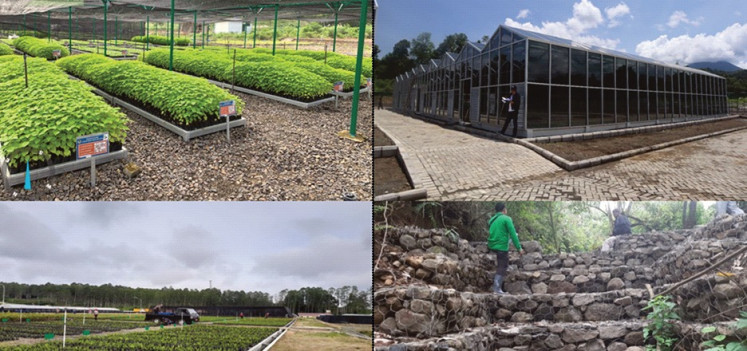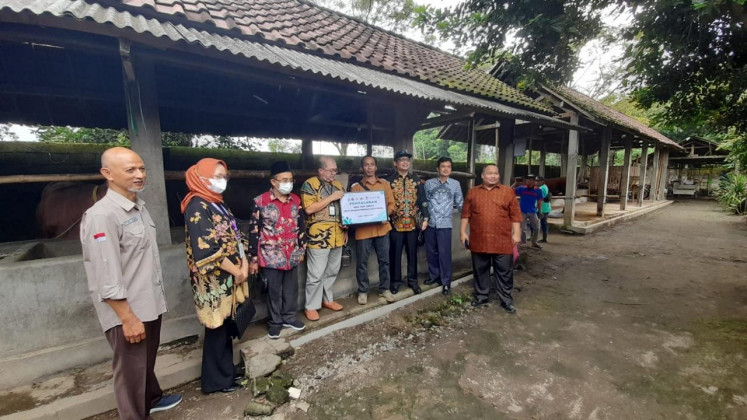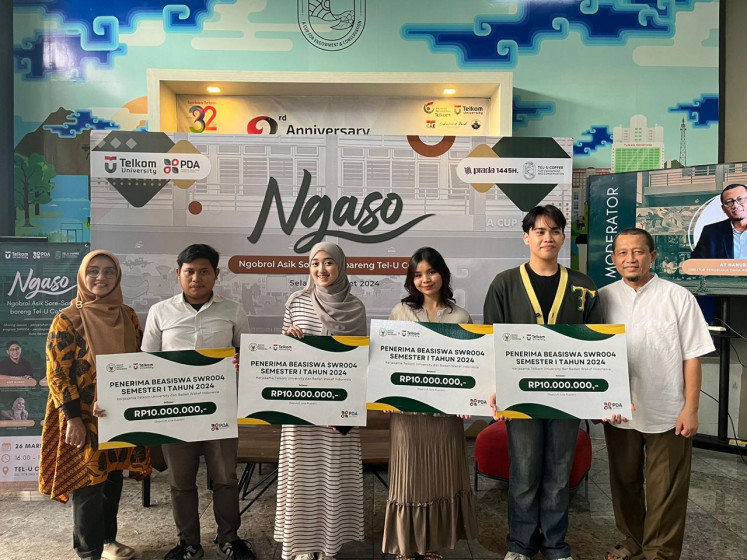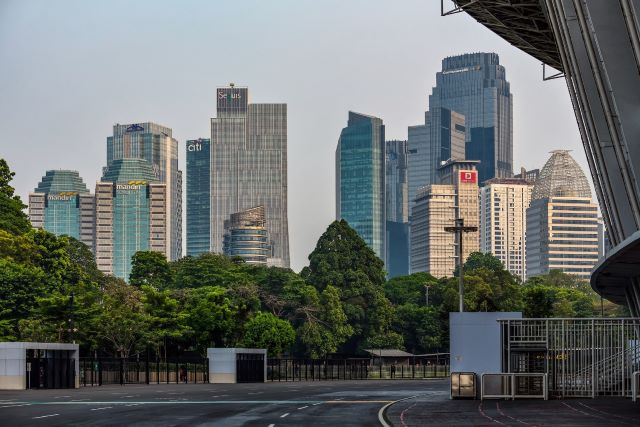Popular Reads
Top Results
Can't find what you're looking for?
View all search resultsPopular Reads
Top Results
Can't find what you're looking for?
View all search resultsSovereign sukuk plays major role in decade of Indonesian development
Change text size
Gift Premium Articles
to Anyone
S
overeign sukuk (SBSN) has played an important role over the past decade of economic and infrastructure development in Indonesia. Also known as Islamic bonds, the sharia-based financing instrument is one effective solution that supports national development while fulfilling the principles of Islamic finance.
Through the issuance of sovereign sukuk, the Indonesian government not only focuses on improving the quality of infrastructure, but also provides an opportunity for citizens to participate in their country’s development through ethical and responsible investment.
Since sovereign sukuk was first issued in 2008, the government has shown a strong commitment to utilizing this instrument for national development. Data from the Finance Ministry showed that from 2014 to 2024, sovereign sukuk financed infrastructure projects worth Rp 241.94 trillion, including toll roads, railways, airports and seaports, as well as education and health facilities.
As a financing instrument, sovereign sukuk has proven its capacity in maintaining the stability of the state budget (APBN) amid fluctuating global economic conditions and liquidity challenges. Its sharia-based approach also attracts domestic and foreign investors that prioritize the principles of financial ethics, which in turn contributes to national fiscal stability.
Tony Prianto, Director of Sharia Financing at the Finance Ministry, said sovereign sukuk had proven its role as a strategic instrument over the past decade of financing national development.
“Through the issuance of sukuk, the government is able to finance various infrastructure projects, such as the construction of roads, bridges, airports, education and health facilities,” he said
Significant infrastructure achievements
Among the greatest achievements of the issuance of sovereign sukuk is the even distribution of infrastructure development in regions nationwide. The Finance Ministry reported that as of Aug. 31, sovereign sukuk has funded a total of 6,104 infrastructure projects, including accessibility projects in underdeveloped remote areas.
One project funded by sovereign sukuk is the Sei Alalak Bridge in Barito Kuala regency, South Kalimantan. The bridge provides connectivity between the province’s largest city of Banjarmasin and various regions in South and Central Kalimantan, saving both time and transportation costs. As it helps facilitate the flow of transportation, logistics and trade between the two provinces, it is expected to encourage economic growth and create new economic centers to improve the quality of life of the surrounding communities.
Support for sustainable development
One of the notable characteristics of sovereign sukuk is that it supports sustainable development.
In 2018, Indonesia became the first country in the world to issue green sukuk, which is specifically designed to support projects that focus on environmental sustainability.
Since then, the government has used green sukuk to fund various environmentally friendly projects, including the development of hydroelectric power plants, waste management facilities and forest conservation initiatives.
One project that is financed by green sukuk proceeds is the Likupang Permanent Nursery Center at the Batu Putih Nature Tourism Park in Bitung, North Sulawesi. The center has successfully produced 2.5 million seedlings of tree and plant species that have multiple ecological and economic value, such as meranti, ironwood, mahogany and coffee, to support land rehabilitation efforts.
The center also plays a vital role in improving the environmental quality in surrounding areas like the Likupang Special Economic Zone, which the government has designated as a super priority tourist destination to support the development of ecological and cultural tourism.
(Source: Green Sukuk Allocation and Impact Report 2023)The success of green sukuk in financing projects that improve environmental qualithy also reflects Indonesia's commitment to supporting the global agenda on climate change and sustainable development. In utilizing the funds generated by green sukuk, the government has succeeded in reducing greenhouse gas emissions and increasing the use of renewable energy, in line with its goal to achieve net-zero emissions by 2060.
Tony said green sukuk was a proven strategic financial instrument in supporting the country’s commitment to sustainable development.
“Green sukuk not only plays a role in financing environmentally friendly infrastructure, but also helps the government achieve climate change mitigation and carbon emission reduction targets. By supporting the financing of green projects, the government creates a sustainable, positive impact on the environment while simultaneously improving the community’s welfare,” he added.
Public and development financing
One of the interesting aspects of sovereign sukuk is that it offers an opportunity to members of the public to participate in national development. Small-scale investors can purchase retail sukuk and savings sukuk at an affordable, nominal value, which creates an ecosystem of inclusive participation in infrastructure development and other strategic projects. In addition, sukuk provides individuals with competitive returns on their investment.
Waqf for community development
Retail Cash Waqf Linked Sukuk (CWLS Ritel) is a cash waqf investment in sovereign sukuk, with returns distributed by nazir, or an Islamic endowment manager, to finance social programs and empower the people's economy.
Through CWLS Ritel, the government facilitates safe and productive cash waqf from both individuals and institutions while actively supporting accelerated growth of the people's economy. With a minimum placement of Rp 1 million (US$64), 100 percent of the funds will be returned when the SBSN matures. The monthly returns are then used as waqf to finance social programs and activities that empower the people’s economy.
Since its launch, CWLS Ritel has funded a variety of development projects that have directly benefited the community, such as educational and health facilities as well as social infrastructure.
One of the main social programs funded by CWLS Ritel series SWR004 in 2023 was a food security program launched by the Indonesian Waqf Agency to empower livestock breeders and farmers. This livestock management program, which uses a profit-sharing pattern, provided mentoring and training from IPB University for livestock breeders who are alumni of the People's Farming School (SPR).
The returns from CWLS Ritel series SWR004 were used to buy livestock for fattening and sale to the community, with the livestock sales’ proceeds reinvested in purchasing more livestock. Profits were distributed under a profit-sharing scheme, with 65 percent given to farmers and 35 percent going to IPB University for distributing as education scholarships.
In the farmers’ empowerment program, the returns from SWR004 waqf were distributed through Rumah Wakaf Indonesia as the partnering nazir to support ginger plant nurseries.
Aside from supporting food security efforts, the returns from CWLS Ritel series SWR004 SWR004 were distributed to educational programs that support the Tri Dharma (three principles) of Higher Education – education, research and community service – through scholarships, research assistance and community empowerment initiatives in collaboration with leading institutions such as IPB University, the 10th November Institute of Technology (ITS) and Telkom University.
Future Prospects
Sovereign sukuk is expected to take an increasingly important role in supporting infrastructure development and economic sustainability. The government is committed to continue developing the sukuk market through the continued issuance of both green sukuk and retail sukuk toward more inclusivity.
In addition, sovereign sukuk plays a crucial role in financing strategic national programs, such as post-pandemic economic recovery, the development of the new national capital and wider digital connectivity.
In view of its bright prospects for the future, sovereign sukuk is expected to continue to be a mainstay instrument in financing national development as it makes greater contributions to economic growth and the welfare of the Indonesian people.
Source: Finance Ministry














